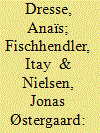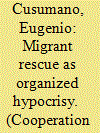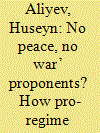|
|
|
Sort Order |
|
|
|
Items / Page
|
|
|
|
|
|
|
| Srl | Item |
| 1 |
ID:
163502


|
|
|
|
|
| Summary/Abstract |
Environmental peacebuilding represents a paradigm shift from a nexus of environmental scarcity to one of environmental peace. It rests on the assumption that the biophysical environment’s inherent characteristics can act as incentives for cooperation and peace, rather than violence and competition. Based on this, environmental peacebuilding presents cooperation as a win-win solution and escape from the zero-sum logic of conflict. However, there is a lack of coherent environmental peacebuilding framework and evidence corroborating the existence of this environment-peace nexus. Building on a multidisciplinary literature review, this article examines the evolution of environmental peacebuilding into an emerging framework. It unpacks the concept and explains its main building blocks (conditions, mechanisms and outcomes) to develop our understanding of when, how and why environmental cooperation can serve as a peacebuilding tool. It assembles these building blocks into three generic trajectories (technical, restorative and sustainable environmental peacebuilding), each characterised according to their own causality, drivers and prerequisites, and illustrated with concrete examples. Finally, this article draws attention to the remaining theoretical gaps in the environmental peacebuilding literature, and lays the foundations for an environmental peacebuilding research agenda that clarifies if and how environmental cooperation can spill over across borders, sectors and scales towards sustainable peace.
|
|
|
|
|
|
|
|
|
|
|
|
|
|
|
|
| 2 |
ID:
163494


|
|
|
|
|
| Summary/Abstract |
In November 2014, Frontex started its Southern Mediterranean border monitoring operation Triton, followed in June 2015 by the Common Security and Defence Policy anti-smuggling mission EU Naval Force Mediterranean (EUNAVFOR Med) ‘Sophia’. Both operations’ outward communication has placed considerable emphasis on the conduct of maritime search and rescue. Still, this commitment was not matched by consistent action. Triton and EUNAVFOR Med have conducted a relatively limited number of search and rescue operations, prioritizing border control and anti-smuggling tasks. This article explains the gap between the European Union missions’ humanitarian rhetoric and an operational conduct primarily focusing on curbing irregular migration as a form of organized hypocrisy. Decoupling talk and action allowed Triton and EUNAVFOR Med to reconcile the conflicting expectations arising from European governments’ willingness to reduce migrant arrivals and the normative imperative to act against the loss of life at sea. However, the European Union missions’ organized hypocrisy had several negative externalities, hindering effective management of the humanitarian crisis offshore Libya.
|
|
|
|
|
|
|
|
|
|
|
|
|
|
|
|
| 3 |
ID:
163501


|
|
|
|
|
| Summary/Abstract |
How does the reform of territorial state structures shape prospects for peace after war? Existing research on the institutional causes of peace often focuses on how institutional designs, as the outcomes of reform processes, reduce post-war violence and promote peace. The literature does less frequently address how the politics that characterise reform processes affect the legitimacy of institutions and whether or not violent protest ultimately takes place: this risks omitting key explanations of how institutional reforms contribute to peace and the mechanisms by which this occurs. By examining the case of Nepal, where clashes between protesters and security forces over constitutional provisions for federalism have killed more than 60 people since August 2015, this study shows that three factors of the territorial reform process contributed to the onset of post-war ethnic violence. These included: (1) elite control of decision-making; (2) tight deadlines that promoted backtracking on previous commitments; and (3) the embedding of single territorial reforms in a ‘concert’ of institutional reforms that, as a whole, sparked fear of discrimination among ethnic minorities.
|
|
|
|
|
|
|
|
|
|
|
|
|
|
|
|
| 4 |
ID:
163499


|
|
|
|
|
| Summary/Abstract |
Previous research on non-state actors involved in civil wars has tended to disregard the role of extra-dyad agents in influencing conflict outcomes. Little is known as to whether the presence of such extra-dyadic actors as pro-regime militias affects conflict termination and outcomes. This article develops and tests a number of hypotheses on the pro-government militias’ effect upon civil war outcomes. It proposes that pro-regime militias involved in intrastate conflicts tend to act as proponents of ‘no peace, no war’, favouring low-activity violence and ceasefires over other conflict outcomes. These hypotheses are examined using an expanded dataset on pro-government militias and armed conflict in a statistical analysis of 229 civil war episodes from 1991 to 2015. These findings shed new light on the role of extra-state actors in civil wars.
|
|
|
|
|
|
|
|
|
|
|
|
|
|
|
|
| 5 |
ID:
163500


|
|
|
|
|
| Summary/Abstract |
Land reform has been depicted by some as an effective element of counterinsurgency strategy in nations experiencing peasant-based civil conflict. While some studies have argued that land reform reduces civilian support for insurgency, other research has demonstrated that these reforms are often undermined by brutal state repression. The study of land reform has also been driven largely by qualitative case study research, which has limited what we know about the cross-national efficacy of these reforms. This study contributes to the current literature by looking at the efficacy of land reform as part of the post-civil war peace process. Specifically, we examine whether land reform provisions included in comprehensive peace agreements reduce the risk of renewed civil war. Measuring the risk of civil war recurrence in all comprehensive peace agreements from 1989–2012, we find that the inclusion of land reform provisions in the post-war peace process substantially reduces the risk of renewed fighting.
|
|
|
|
|
|
|
|
|
|
|
|
|
|
|
|
| 6 |
ID:
163497


|
|
|
|
|
| Summary/Abstract |
In this article I put forward a social constructivist perspective on state use of Private Military and Security Contractors (PMSCs). I will argue that state outsourcing decisions are, to a large extent, shaped by nationally shared values, understandings and dispositions. Concretely, I first provide a detailed overview of the extent of domestic and deployed contracting by the Danish Defence and, thereafter, based on a number of semi-structured interviews, I expose the dominant understandings that shaped how PMSCs have come to be understood in Denmark. By so doing I can show that the employment of PMSCs by the Danish Defence remains comparatively limited because it is largely perceived as inappropriate and as incompatible with what it means to be ‘Danish’. Although Denmark too has to balance its international engagements with the limited resources allocated to defence (the typical functional pressures) Danish particular ‘soft’ neoliberalism and ‘hard’ commitments to IHL speak against using private actors to make that possible. This means I take in the more abstract, macro-level discussions on the end of the Cold War and the advent of neoliberalism but go beyond by asking whether, and if so how, these and other collective experiences and understandings actually (co-)shape(d) outsourcing decisions.
|
|
|
|
|
|
|
|
|
|
|
|
|
|
|
|
|
|
|
|
|